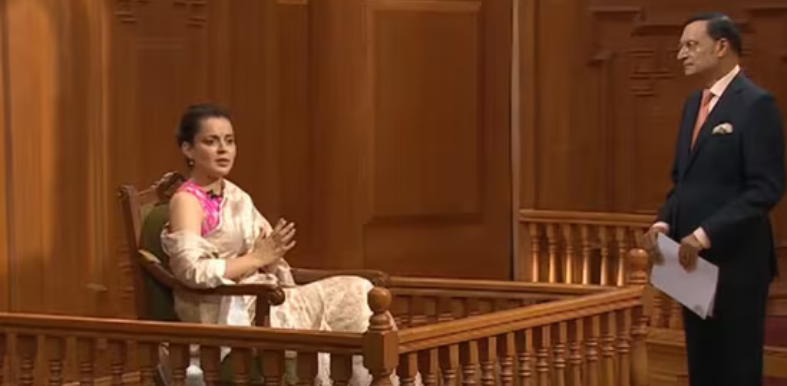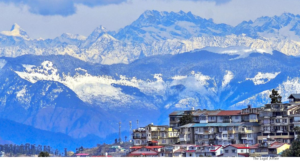Mandi’s MP Kangana Takes Bold Stand on National TV: Addresses Bollywood, Politics, and Controversies

Mandi: Kangana Ranaut, the actress-turned-politician and current Member of Parliament from Mandi, Himachal had made a bold appearance on the national television show, Aap Ki Adalat. In a exclusive interview with Rajat Sharma, Editor-in-Chief of India TV, Kangana addressed various controversies that have surrounded her, from her outspoken remarks about Bollywood to her stance on the farmers’ protest and her upcoming film, Emergency.
Kangana’s Bold Statements on Bollywood and Industry Dynamics
Kangana did not shy away from reiterating her critical views on Bollywood. When questioned about her previous comments that Bollywood stars are overly concerned with materialism rather than meaningful discourse, she responded firmly:
“Yes, I said this, and I stand by my words. Do Bollywood guys speak about Shakespeare or the preservation of arts? Whenever they meet, they gossip about ‘I bought this watch, this car.’ Some are involved in drugs, TADA cases, hawala, flesh trade, and Me Too cases, yet I am painted as the villain. I have spent 20 years in the industry,” she remarked, emphasizing the deep-seated issues she perceives in the film industry.
Taking on Bollywood A-Listers
The Mandi MP didn’t stop there. Addressing her comments about Ranbir Kapoor, whom she had previously labeled a “skirt chaser,” she challenged, “You are saying as if he is Swami Vivekananda.” She added a personal anecdote about Kapoor visiting her home, highlighting her candid approach to the controversial dynamics within Bollywood.
Controversy Surrounding ‘Emergency’ and Sikh Representation
A major point of contention during the interview was her upcoming film Emergency, where she portrays former Prime Minister Indira Gandhi. The film has drawn criticism from the Sikh community, particularly the Shiromani Gurudwara Parbandhak Committee (SGPC), who argue that it spreads an “anti-Sikh narrative.”
Defending her film, Kangana stated, “I approached SGPC people, showed them my movie. They want me not to show that Sikhs killed Indira Gandhi. Then what should I show? That she died by lightning?” She insisted that altering historical facts would be misleading and assured viewers that the film would provide a clear narrative once released.
Clarifications on Kisan Andolan
Kangana, now active in politics, addressed the backlash over her comments on the farmers’ protests. She clarified, “What I had said was, at the protest site of farmers, bodies were found, and gang rape did take place. I never said farmers did this; anti-social elements did this. I have the video coverage with me.” She also commented on the anti-CAA protests at Shaheen Bagh, asserting that many participants were paid and reappeared at the farmers’ protests.
Despite criticism from within her party, Kangana remained firm, stating, “People in BJP love me; they are honest and sincere people.”
On Balancing Politics and Cinema
Then asked whether she plans to leave the film industry for politics, Kangana admitted the challenge of balancing both fields. “Since the day I joined politics, I could not do even a day’s shooting during the last six months. I am trying to balance. Let’s see what happens,” she said, adding that the film industry might be pleased if she “runs away.”
Talks on Rahul Gandhi’s Conduct in Lok Sabha
Kangana also criticized Congress leader Rahul Gandhi, describing his conduct in the Lok Sabha as bizarre. “He brought photos of various deities, claiming they were using the Congress party’s hand symbol as if they were brand ambassadors. He even declared, ‘I belong to Shivji Ki Baraat,’ and then sat down, staring blankly. I felt like asking someone to check on him,” she recounted.
Nation’s Sentiments Reflected, Says Kangana
When questioned about her comments calling Rahul Gandhi “bitter” and “poisonous,” Kangana doubled down, stating, “That’s what the entire nation is saying. He goes abroad and asks America to intervene in our internal affairs. He is constantly trying to divide our country, whether on the basis of caste, economic issues, or borders.”




